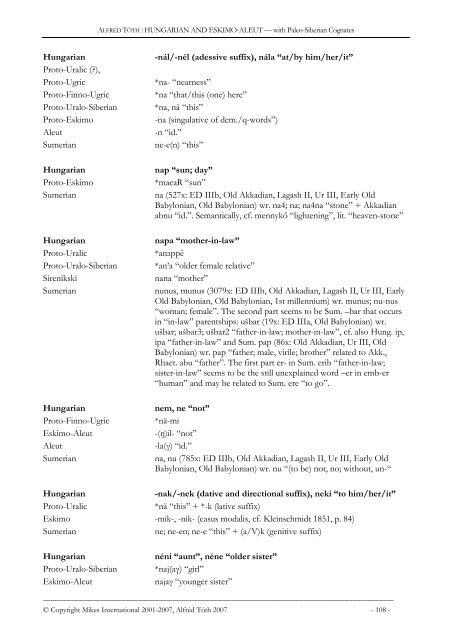Hungarian and Eskimo-Aleut
Hungarian and Eskimo-Aleut
Hungarian and Eskimo-Aleut
Create successful ePaper yourself
Turn your PDF publications into a flip-book with our unique Google optimized e-Paper software.
ALFRÉD TÓTH : HUNGARIAN AND ESKIMO-ALEUT — with Paleo-Siberian Cognates<br />
<strong>Hungarian</strong> -nál/-nél (adessive suffix), nála “at/by him/her/it”<br />
Proto-Uralic (?),<br />
Proto-Ugric *na- “nearness”<br />
Proto-Finno-Ugric *na “that/this (one) here”<br />
Proto-Uralo-Siberian *na, nä “this”<br />
Proto-<strong>Eskimo</strong> -na (singulative of dem./q-words”)<br />
<strong>Aleut</strong> -n “id.”<br />
Sumerian ne-e(n) “this”<br />
<strong>Hungarian</strong> nap “sun; day”<br />
Proto-<strong>Eskimo</strong> *macaR “sun”<br />
Sumerian na (527x: ED IIIb, Old Akkadian, Lagash II, Ur III, Early Old<br />
Babylonian, Old Babylonian) wr. na4; na; na4na “stone” + Akkadian<br />
abnu “id.”. Semantically, cf. mennykő “lightening”, lit. “heaven-stone”<br />
<strong>Hungarian</strong> napa “mother-in-law”<br />
Proto-Uralic *anзppē<br />
Proto-Uralo-Siberian *an’a “older female relative”<br />
Sirenikski nana “mother”<br />
Sumerian nunus, munus (3079x: ED IIIb, Old Akkadian, Lagash II, Ur III, Early<br />
Old Babylonian, Old Babylonian, 1st millennium) wr. munus; nu-nus<br />
“woman; female”. The second part seems to be Sum. –bar that occurs<br />
in “in-law” parentships: ušbar (19x: ED IIIa, Old Babylonian) wr.<br />
ušbar; ušbar3; ušbar2 “father-in-law; mother-in-law”, cf. also Hung. ip,<br />
ipa “father-in-law” <strong>and</strong> Sum. pap (86x: Old Akkadian, Ur III, Old<br />
Babylonian) wr. pap “father; male, virile; brother” related to Akk.,<br />
Rhaet. abu “father”. The first part er- in Sum. erib “father-in-law;<br />
sister-in-law” seems to be the still unexplained word –er in emb-er<br />
“human” <strong>and</strong> may be related to Sum. ere “to go”.<br />
<strong>Hungarian</strong> nem, ne “not”<br />
Proto-Finno-Ugric *nä-mi<br />
<strong>Eskimo</strong>-<strong>Aleut</strong> -(ŋ)il- “not”<br />
<strong>Aleut</strong> -la(γ) “id.”<br />
Sumerian na, nu (785x: ED IIIb, Old Akkadian, Lagash II, Ur III, Early Old<br />
Babylonian, Old Babylonian) wr. nu “(to be) not, no; without, un-“<br />
<strong>Hungarian</strong> -nak/-nek (dative <strong>and</strong> directional suffix), neki “to him/her/it”<br />
Proto-Uralic *nä “this” + *-k (lative suffix)<br />
<strong>Eskimo</strong> -mik-, -nik- (casus modalis, cf. Kleinschmidt 1851, p. 84)<br />
Sumerian ne; ne-en; ne-e “this” + (a/V)k (genitive suffix)<br />
<strong>Hungarian</strong> néni “aunt”, néne “older sister”<br />
Proto-Uralo-Siberian *naj(aγ) “girl”<br />
<strong>Eskimo</strong>-<strong>Aleut</strong> najaγ “younger sister”<br />
___________________________________________________________________________________<br />
© Copyright Mikes International 2001-2007, Alfréd Tóth 2007 - 108 -

















